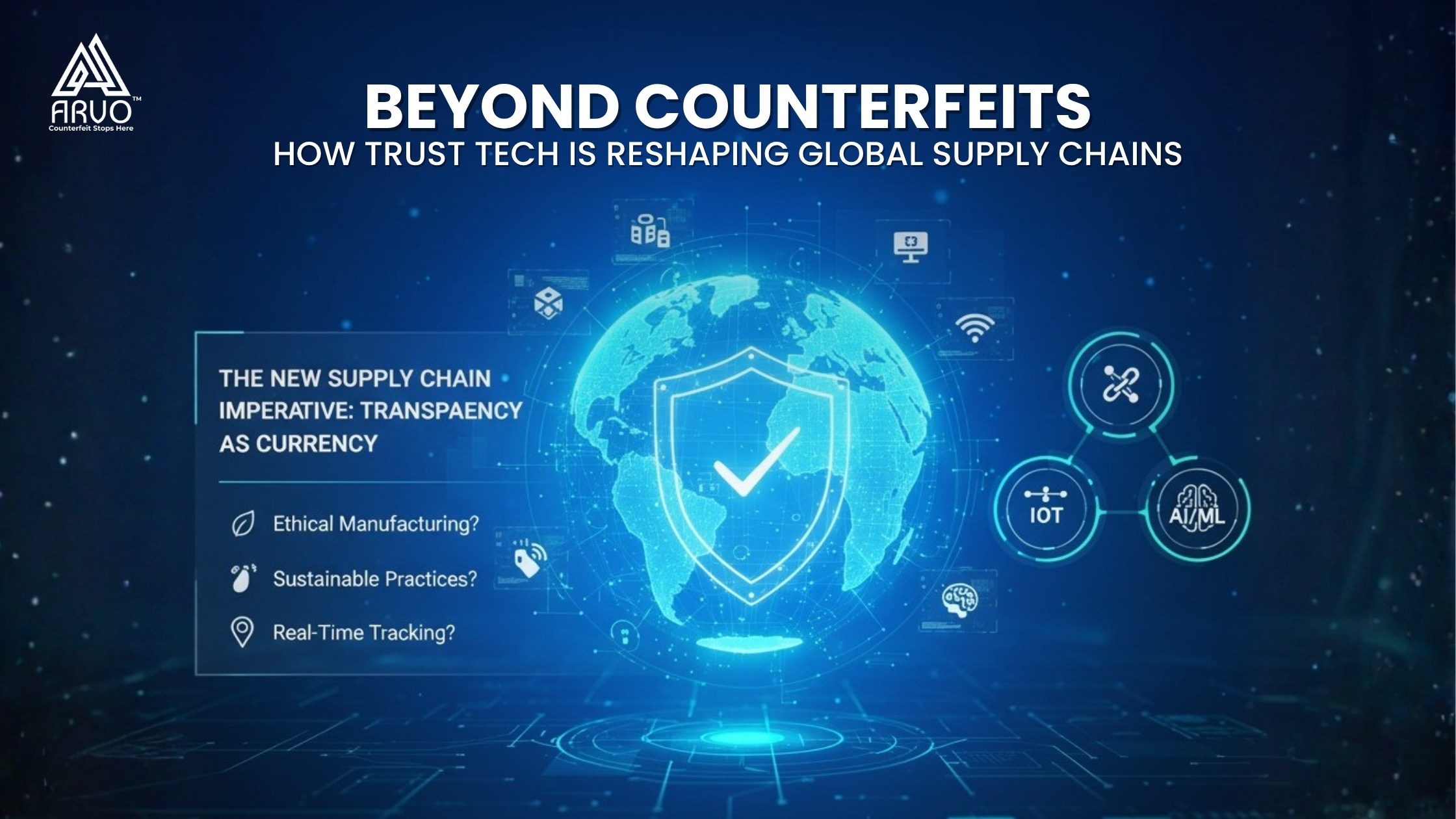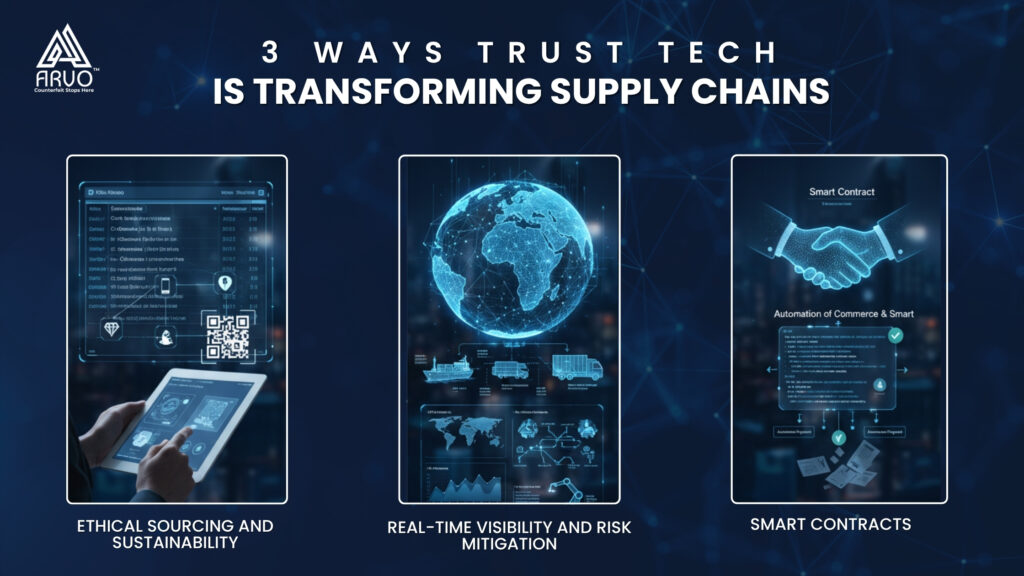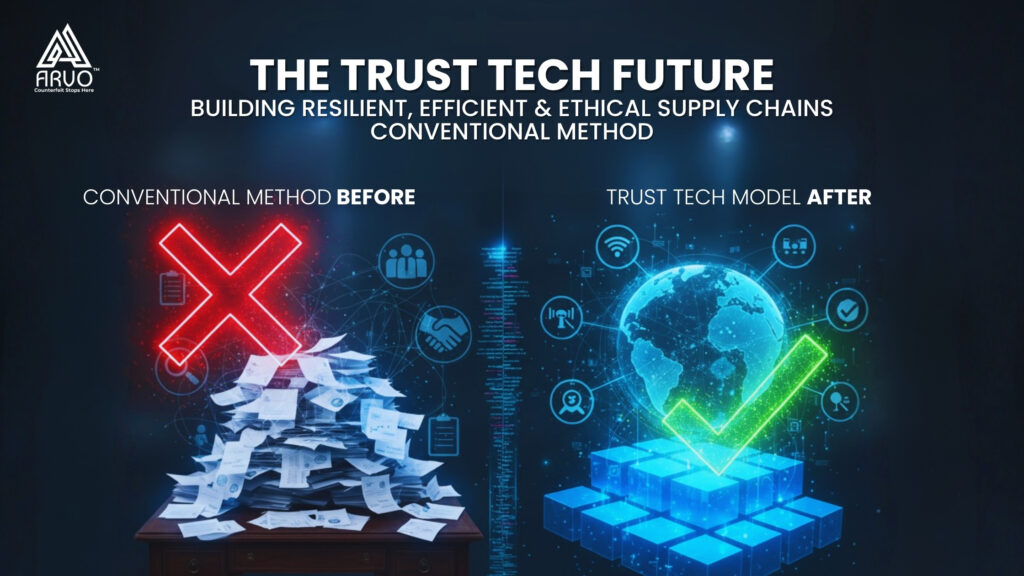
The most apparent way that technology assists supply chains is the fight against fake products, which has been going on over the years. Specialized QR codes, RFID tags and initial blockchain applications served as a digital shield, allowing consumers and businesses to verify whether something was authentic.
And now a greater change is taking place. A new collection of tools, dubbed Trust Tech, does much more than prevent fakes. It is an integrated system that addresses the core issue in the supply chains, which is the lack of trust, transparent information, and complete visibility throughout the supply chain.
Blockchain, the Internet of Things (IoT), and Artificial Intelligence (AI) and Machine Learning (ML) are the primary technologies employed by Trust Tech. It is not merely about product protection but transformation of the way companies interact, conduct ethically and the efficiency of the entire system.
The New Supply Chain Imperative: Transparency as Currency
Nowadays individuals and control bodies desire more than a mere authentic stamp. The investors, customers and others desire the entire story of a product. They ask:
- Did it manufacture the product in an ethical manner? (e.g. do the raw materials conflict-free?)
- Was it made sustainably? (What is its carbon footprint? Were labor rules followed?)
- Where is it right now? (In the case of perishable goods or high-value goods, real-time tracking is required.)
Trust Tech fulfills these requirements by establishing a safe, common, and immutable digital history of a product.

3 Ways Trust Tech is Transforming Supply Chains
1. The Full Story: Ethical Sourcing and Sustainability
The contemporary supply chain is so complicated that it is a massive challenge to source in a truly ethical manner. One product, such as a smartphone, may contain material in a large number of countries and be produced in various continents.
- The Role of Blockchain: It is an immutable history of the origin of every material. The information is recorded whenever a material is transferred, certified, or worked on. This provides concrete evidence of origin and that the product is of environmental and social standards (ESG). Companies can also track materials to the mine or farm, providing investors and regulators with confidence in claims of sustainability.
- Beyond the label: To the customer, it is a code that they can scan that not only assures them of authenticity, but also provides the complete story, such as that a luxury diamond is conflict-free or that a coffee blend is produced under fair-trade labor standards.
2. Intelligence on the Move: Real-Time Visibility and Risk Mitigation
Supply chain issues, which are either politically instigated or natural disasters, can be costly in billions. Simple GPS tracking provides sparse information. Trust Tech transforms physical information into an electronic account, which offers actual real-time operational visibility.
- IoT Sensors: Shipment sensors monitor the conditions of temperature, humidity, and shock. When a shipment of cold vaccines or fresh produce is out of a safe temperature, the sensor will record this and immediately issue a notice.
- AI and ML in Action: AI algorithms are based on live IoT and blockchain data to forecast bottlenecks or failures. They can predict the fluctuations in demand more precisely, organize smarter international shipping paths, and even anticipate the failures of equipment in the warehouses before they occur. This proactive strategy transforms a reactive and costly logistics model into a versatile, robust one.
3. Automation of Commerce: Smart Contracts
Paper contracts, invoices, and payment slows down everything, introduce errors, and require intermediaries. These are essential business processes that are automated by Smart Contracts, which are designed on blockchain.
How it Works: A contract is a self-executing code written. To illustrate, a supplier receives money only when the data of IoT sensors indicate that goods have reached a port and are in the agreed temperature interval. It does not need any manual checking, which significantly reduces the transaction time, cost, and disputes. This fast, mistrustful implementation creates good business-to-business confidence across boundaries.

The Trust Tech Future
The conventional method of business was based on paper documents, audits, and personal contacts, which could not withstand the complexity of the global world. This weakness is substituted by the new model, which is powered by Trust Tech and a base of shared, verified, and tamper-proof data.
It is not merely a chance of catching those who sell fakes but providing honest players with the means to create resilient, efficient, and actually ethical supply chains. To any company that engages in global trade, the adoption of Trust Tech is no longer a competitive advantage, but it is becoming the cost of entry in a world where transparency is the most valuable commodity.
FAQ
Q1: What is “Trust Tech” in the context of supply chains?
Trust Tech is an amalgamation of high-tech equipment, primarily Blockchain, IoT, and AI/ML, that can enable everyone to see the supply chain transparently and maintain records that are immutable. It is not only preventing fakes but also establishing a better trust in all parties.
Q2: How does Trust Tech go “beyond counterfeits”?
Initially, Trust Tech was primarily applied to determine whether a product is genuine. It also examines non-physical things, such as whether labor is fair, whether the product is environmentally friendly, and whether it complies with legal rules. It provides a complete, authentic history of the product, not a stamp of authenticity.
Q3: What specific role does Blockchain play in this framework?
Blockchain is a distributed registry that is immutable. It records all the sales, all the transfers of ownership, or all the certifications, including an audit of ethical sourcing, in a manner that cannot be altered by anyone. This renders the fact of the origin of the product and whether it is within the rules credible.
Q4: What are “Smart Contracts” and how do they relate to Trust Tech?
Smart Contracts are computer programs that are stored in a blockchain and are run automatically. They ensure that the conditions of a contract are fulfilled without the need for anyone to verify them. As an example, the payment can be automatically sent once the IoT data indicates that a shipment has arrived safely and with the correct temperature. This speeds up global trade.